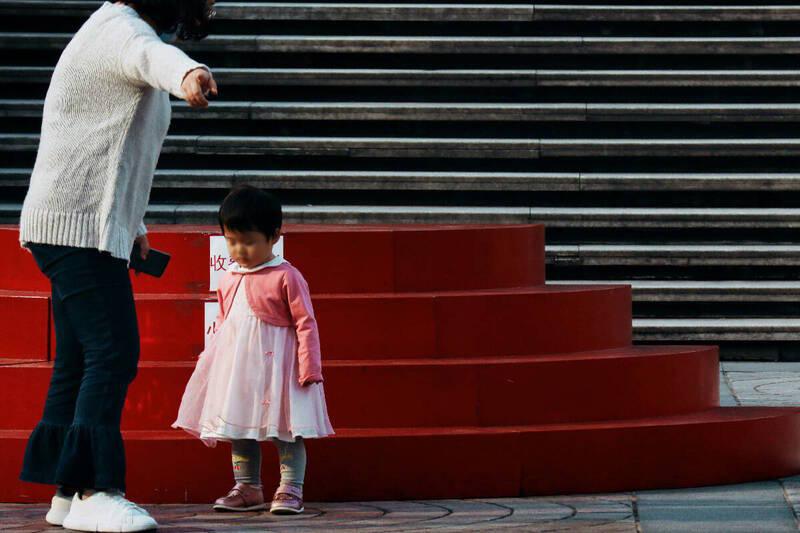Nearly 80 percent of parents are worried about their children falling behind at school, while close to 20 percent of children under 12 do not finish after-school classes until 8pm, a study by the Child Welfare League Foundation showed today.
As a new school year is set to begin on Monday, the foundation conducted an online survey of 1,090 parents of children under 12, finding that 65 percent of children attend cram schools and extracurricular classes.
Among the nearly 60 percent of children enrolled in extracurriculars, 46.2 percent take just one, while 35.7 percent take two and 18.1 percent take three or more, the foundation said as it shared its annual report on parents’ anxiety levels.

Photo courtesy of the Child Welfare League Foundation
With summer study camps popping up across the country, up to 60 percent of parents send children as young as six — before beginning first grade — to preparatory classes and phonics lessons, it said.
Taiwan’s competitive education system is not only pressuring children, but is also leaving parents anxious to keep up, as nearly 60 percent of parents surveyed spend several thousand to more than NT$10,000 a month on extra learning for their children, it said.
More than 90 percent reported that the classes place a burden on family finances, especially those with two or more children, it added.
About 66.2 percent of parents reported feeling anxious when their child does not perform as expected, the foundation said, adding that the more parents spend on extracurriculars, the more preoccupied they become with their child’s education.
Almost 50 percent of parents surveyed said they felt pressure to “not make mistakes,” and 64 percent often worry they are not measuring up, reporting that constant comparison and a lack of information leave them anxious, it said.
About 96.1 percent of parents said they enjoy spending quality time with their children, although 38 percent believe their children are their primary cause of stress and 31.9 percent said that if they could start over again, they would choose not to have children, it said.
About 74.8 percent of parents wish they could receive additional financial support, while 55.9 percent hope for improved educational resources, 40.8 percent want better childcare resources and 36.7 percent would like more workplace flexibility, the foundation said.
Meanwhile, 41.2 percent hoped for a more supportive social environment, it added.
To relieve the burden on parents, the foundation suggested extended childcare policies, special tax deductions and increased tax benefits for families with school-age children.
It pointed to Japan and South Korea, where childcare allowances cover school-age children and create incentives for businesses to support parents.
In the US, lower grades rely more on teacher observations and class presentations than a rigorous exam culture, it added.

Eight restaurants in Taiwan yesterday secured a one-star rating from the Michelin Guide Taiwan for the first time, while three one-star restaurants from last year’s edition were promoted to two stars. Forty-three restaurants were awarded one star this year, including 34 in Taipei, five in Taichung and four in Kaohsiung. Hosu (好嶼), Chuan Ya (川雅), Sushi Kajin (鮨嘉仁), aMaze (心宴), La Vie by Thomas Buhner, Yuan Yi (元一) and Frassi in Taipei and Front House (方蒔) in Kaohsiung received a one-star rating for the first time. Hosu is known for innovative Taiwanese dishes, while Chuan Ya serves Sichuan cuisine and aMaze specializes

STATS: Taiwan’s average life expectancy of 80.77 years was lower than that of Japan, Singapore and South Korea, but higher than in China, Malaysia and Indonesia Taiwan’s average life expectancy last year increased to 80.77 years, but was still not back to its pre-COVID-19 pandemic peak of 81.32 years in 2020, the Ministry of the Interior said yesterday. The average life expectancy last year increased the 0.54 years from 2023, the ministry said in a statement. For men and women, the average life expectancy last year was 77.42 years and 84.30 years respectively, up 0.48 years and 0.56 years from the previous year. Taiwan’s average life expectancy peaked at 81.32 years in 2020, as the nation was relatively unaffected by the pandemic that year. The metric

Taiwan High Speed Rail Corp. (THSRC) plans to ease strained capacity during peak hours by introducing new fare rules restricting passengers traveling without reserved seats in 2026, company Chairman Shih Che (史哲) said Wednesday. THSRC needs to tackle its capacity issue because there have been several occasions where passengers holding tickets with reserved seats did not make it onto their train in stations packed with individuals traveling without a reserved seat, Shih told reporters in a joint interview in Taipei. Non-reserved seats allow travelers maximum flexibility, but it has led to issues relating to quality of service and safety concerns, especially during

A magnitude 5.1 earthquake struck Chiayi County at 4:37pm today, the Central Weather Administration (CWA) said. The hypocenter was 36.3km southeast of Chiayi County Hall at a depth of 10.4km, CWA data showed. There were no immediate reports of damage resulting from the quake. The intensity of the quake, which gauges the actual effect of a seismic event, measured 4 in Chiayi County, Tainan and Kaohsiung on Taiwan's seven-tier intensity scale, the data showed. The quake had an intensity of 3 in Chiayi City and Yunlin County, while it was measured as 2 in Pingtung, Taitung, Hualien, Changhua, Nantou and Penghu counties, the data